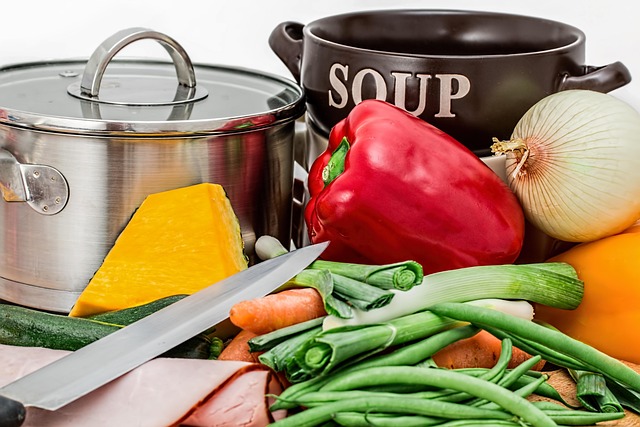Smart kitchen devices are transforming culinary spaces by combining advanced technology with sustainability. Driven by consumer demand for eco-friendly solutions, these innovations reduce energy and water usage while enhancing food preparation and organization. Using materials like silicone and bamboo, they offer durable, functional alternatives that minimize environmental impact. Features like smart refrigeration and AI-driven meal planning help consumers make sustainable choices, reducing waste and promoting recycling practices in modern kitchens.
In today’s eco-conscious world, the kitchen, once a hub of environmental concern due to its energy consumption, is transforming into a haven for sustainable innovations. We explore the rise of smart kitchen devices designed with the environment in mind. From energy-efficient appliances to sustainable materials and waste-reducing innovations, these smart kitchen devices are not just stylish but also eco-friendly game-changers. Discover how these advancements are revolutionizing the way we cook and live sustainably.
- The Rise of Eco-Friendly Smart Kitchen Devices
- Energy-Efficient Appliances: A Game-Changer for Sustainability
- Sustainable Materials and Their Role in Modern Kitchen Accessories
- Innovations in Smart Kitchens: Reducing Waste and Promoting Recycling
The Rise of Eco-Friendly Smart Kitchen Devices
In recent years, there’s been a noticeable shift in the kitchen accessories market as consumers become increasingly conscious of their environmental impact. This trend has sparked the rise of eco-friendly smart kitchen devices that not only aid in food preparation and organization but also minimize waste and energy consumption. Smart kitchen devices, powered by advanced technology, offer sustainable solutions for everyday tasks. For instance, smart refrigerators with advanced sensors can optimize food storage, reducing spoilage, while voice-activated smart speakers integrated into kitchens enable hands-free control of smart appliances, further minimizing energy wastage.
These innovations not only contribute to a greener lifestyle but also enhance the kitchen experience with features like automated recipe suggestions based on available ingredients and real-time inventory updates. As consumer demand for sustainable products continues to grow, manufacturers are responding by developing more eco-conscious smart kitchen devices, further cementing their place in today’s market.
Energy-Efficient Appliances: A Game-Changer for Sustainability
In today’s eco-conscious world, energy-efficient appliances are transforming the way we think about our kitchens and their environmental impact. These smart kitchen devices aren’t just trendy; they’re game-changers for sustainability. By utilizing advanced technology, these appliances significantly reduce energy consumption without compromising performance. For instance, smart refrigerators with improved insulation and temperature control help minimize power usage while keeping food fresh longer.
Moreover, energy-efficient dishwashers and washing machines employ innovative cleaning methods that use less water and electricity, aligning perfectly with eco-friendly living goals. These appliances not only lower utility bills but also contribute to a greener planet by reducing carbon footprints. As consumers become more aware of their environmental responsibilities, the demand for such smart kitchen devices is on the rise, driving manufacturers to innovate further in the field of sustainable home solutions.
Sustainable Materials and Their Role in Modern Kitchen Accessories
In the realm of modern kitchen accessories, sustainable materials are playing a pivotal role in creating eco-friendly and stylish options for smart kitchen devices. These materials range from organic fabrics to recycled plastics, all chosen for their minimal environmental impact. For instance, silicone, derived from sand, is a popular choice for kitchen tools due to its flexibility, durability, and non-stick properties—all while being fully recyclable at the end of its life cycle.
Additionally, bamboo has become a game-changer in cutlery and kitchenware. This fast-growing grass is highly renewable and offers a natural, aesthetically pleasing alternative to plastic or metal. Bamboo utensils, cutting boards, and even smart storage solutions are gaining popularity among environmentally conscious consumers. These sustainable materials not only reduce waste but also contribute to a healthier planet, ensuring that our kitchens become more eco-friendly without compromising on functionality or design.
Innovations in Smart Kitchens: Reducing Waste and Promoting Recycling
In recent years, innovations in smart kitchen devices have led to significant strides in reducing food waste and promoting recycling practices. These technologies are transforming kitchens into more eco-conscious spaces by providing users with tools that optimize resource usage. For instance, smart refrigerators equipped with sensors can monitor food stocks, alerting owners when items are running low, thereby reducing the risk of overpurchasing and minimizing spoilage.
Additionally, integrated recycling systems in these smart kitchens facilitate proper waste segregation at source, ensuring that recyclable materials are correctly processed. These devices often come with AI-driven apps that offer personalized tips on meal planning, ingredient substitutions, and storage methods, further empowering users to make sustainable choices that cut down on food waste.
As we’ve explored, the integration of eco-conscious principles into kitchen accessories through innovations like smart kitchen devices is not only a trend but a necessary step towards sustainability. Energy-efficient appliances and sustainable materials are playing a pivotal role in reducing environmental impact while offering efficient, modern solutions for daily cooking needs. By embracing these advancements, we can create kitchens that are both functional and harmonious with our planet’s future.
